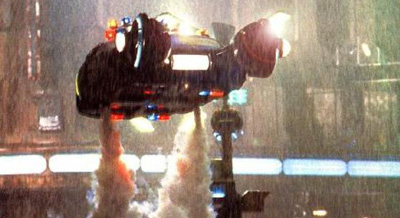Viking Night
Blade Runner
By Bruce Hall
July 26, 2011
Almost everyone feels like they have a good grip on what it means to be a person. But what would it mean to be human if you could be replaced? As much as we like to think of ourselves as individuals, we’re also all an awful lot alike. The disciplines of medicine, psychology and criminal justice depend on how similar we all are, but our ability to transcend that sameness is precisely what gives us our humanity. So, how might you feel if you felt your uniqueness coming apart, if you suddenly felt everything you thought you knew about the human experience might be a lie? How would that make you behave; what might that drive you to do? To what lengths would you go to reclaim your identity, and indeed the very essence of what you are? Don’t answer yet, because you haven’t met Rick Deckard. You haven’t met Roy Batty. You have yet to immerse yourself in the wonderful world of Ridley Scott’s Blade Runner.
That world is in a dystopian Los Angeles, not quite ten years from the time of this writing. It would appear that the world economy has hit a speed bump. Material resources have become difficult to come by and the earth is a grimy, overpopulated mess. The world’s cities and the people who live in them have a bleak, retro-futuristic look to them as if they’ve been slapped together from whatever was lying around at the time. Right away, Blade Runner makes the future look full of promise and possibility, all achieved at a great and terrible cost. And part of that cost involves the hazards of space exploration. Mining asteroids for the raw materials humanity needs is tough work, and human life is too valuable to risk. The powerful corporations behind the world’s economy use machines for this dirty work; humanoid creatures called Replicants. These beings are essentially androids, totally indistinguishable from the humans who created them.
Now, I hate it when I call my credit card company and I have to talk to one of those stupid robots that wants to interact with you by trying to sound human. The more they try, the creepier they are, and this is probably why Replicants are made to be so lifelike. In fact, the company at the forefront of Replicant technology is the Tyrell Corporation, whose motto is “More Human than Human”. It makes for good business, but humans have a tendency to crave freedom and the machines they’ve created to serve them are no different. For this reason, Replicants are given a four year life span and are forbidden to live on Earth. It would be too easy for them to blend in and disappear, robbing their owners of a considerable investment. But much like their human masters, Replicants don’t always obey the law. That’s why there are Blade Runners.
Blade Runners are a special kind of cop, trained to hunt down and “retire” Replicants who dare return to their homeworld. Richard Deckard (Harrison Ford) is such a man, and he is our hero. But when we meet him, he looks significantly less than heroic. Deckard is a guy who seems like he wants to crawl under the bed with a bottle of scotch and never come out again. We find out why when he’s cornered at a sushi stand by a colleague (Edward James Olmos) - summoning him to headquarters to meet with their boss, Captain Bryant (Emmett Walsh). Deckard happens to have a knack for sniffing Replicants out, and right now four of these "skin jobs" have gone AWOL and returned to Earth. They’re walking the streets of Los Angeles, leaving a trail of death and destruction in their wake. There’s never been an incursion like this and although he’s tried to retire from the Force, Deckard is more or less drafted back into service.
Continued:
1
2
3
|
|
|
|




